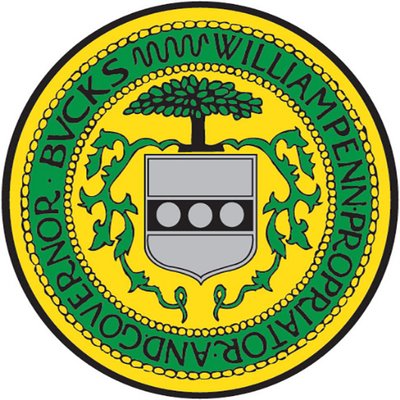The Bucks County Commissioners on Wednesday released a comprehensive transition team report that assesses county government functions and recommends improvements, efficiencies and best practices to be considered both immediately and in the years to come.
The 153-page Bucks County Transition Team Final Report can be read here. It recommends actions ranging from cutting costs to overhauling the county website, converting to clean energy and other green practices, enhancing workforce development efforts, refurbishing county parks, selling unnecessary properties and aggressively pursuing affordable housing, to name a few.
Months in the making, the document is a compilation of seven subcommittee reports addressing budget and finance, communications and information technology, economic development, environment and energy, health and human services, and facilities, parks and infrastructure.
The subcommittees and a seven-member executive committee comprised more than 65 citizen volunteers under the oversight of attorney Thomas J. Jennings, who served as chair of the transition team. Assembled shortly after the November elections, the subcommittees have worked since at least December to research county government operations, interview key personnel and meet with citizens for information and insights.
“Their recommendations reflect an enormous effort and innumerable hours freely given in public service to the County,” Jennings wrote in the report’s introduction. “The legacy of these selfless citizens will have a long-lasting impact on the way of life in the County.”
At the Board of Commissioners meeting Wednesday morning, County Commissioners Diane Ellis-Marseglia, Bob Harvie and Gene DiGirolamo voted unanimously to accept the transition team’s report and to set about weighing and implementing its suggestions – some already under way, some in the immediate future, and others well down the road.
“This does not mean that we are all of a sudden going to do everything that is in that transition report,” Marseglia said. “…This is like a report card that we can keep going back to.”
Harvie noted that the meeting was being live-streamed to the public out of necessity because of COVID-19 restrictions, but pointed out that live-streaming county meetings was among the transition team’s immediate action items. County department leaders are already at work to identify across-the-board budget cuts of 2 percent, which would reduce county expenses by $8 million this year and balance the budget – another immediate action urged by the report.
“Some of the recommendations are much more far-reaching and could take years and years to implement, if we choose to do them,” Harvie said. But all will be considered seriously, he said, because “they are ultimately about making this county government work more efficiently and in a better way for the people of this county.”
The commissioners have already asked county division leaders to submit written plans for implementing a list of goals and directives included in the report that cut broadly across county government.
In addition to excising 2 percent from departmental budgets and live-streaming meetings, immediate action items suggested by the transition team include:
– Testing security of county computer systems by simulating a cyberattack to identify weaknesses
– Improving the county website to make it more navigable, mobile-friendly and informative, and building a county social media strategy
– Creating a director of economic development position to oversee all economic development departments, and creating an economic advisory committee to spearhead economic recovery in Bucks
– Supporting new, entrepreneurial companies with venture capital support, investing in the county’s start-up community, creating a message and brand for Bucks County economic development, creating a new business portal pointing businesses to essential services and tools, starting a modern jobs board and making tourism a center of the county’s recovery strategy
– In cooperation with Bucks County Community College, creating a coordinated workforce development training system geared to the needs of Bucks County employers and residents
– Pledging 100 percent clean energy use by the county within 10 years, and Net-zero carbon emissions countywide by 2045
– Using LED lighting in county buildings and conducting a building audit of county facilities to identify energy efficiency and cost-saving opportunities
– Purchasing electric county vehicles and charging stations
– Helping area farmers market their goods and supplement their incomes
– Restoring Stover Myers Mill and Peace Valley Park, and improving trail signage at all county parks
– Initiating a countywide annual strategic planning process to identify and implement objectives that cut across county divisions
– Digitizing the signature process for contracts and resolutions to save on paper and ink, and to expedite the contract and resolution process
– Taking actions to maximize current revenue streams
– Assessing the practicality of more telecommuting, and codifying plans for telecommuting in the event of an emergency
– Applying lessons learned from COVID-19 to improve pandemic emergency plans
– Moving the Workforce Development Board into county offices
– Consolidating Mental Health and Behavioral Health departments for efficiencies
– Studying the sell-off of “non-core” county assets and properties
– Reducing or eliminating the use of part-time solicitors for county legal work
– Hiring a full-time grant writer or hiring an outside firm to secure more grants
– Promoting development of attainable and affordable housing in the county
– Pilot-testing a rent subsidy program
– Better addressing the needs of homeless people, including establishing year-round, temporary drop-in shelters
– Promoting better public awareness of the functions of county departments
Members of the Transition Team Executive Committee included Commissioners Marseglia and Harvie; attorneys Thomas Jennings, Michael Clarke, Kyong Ha Growney and Gregory McCarthy; and Eric Nagy, the county’s director of policy and projects.
Subcommittee chairs were:
– Thomas Lynch, Budget & Finance
– John B. Lewis, Communications and Information Technology
– Steve Wray, Economic Development
– Steve Santarsiero, Environment and Energy
– Joe Frederick, Facilities, Parks and Infrastructure
– Amy Strouse, Government Efficiency
– Kathleen Walsh Beveridge, Health and Human Services


